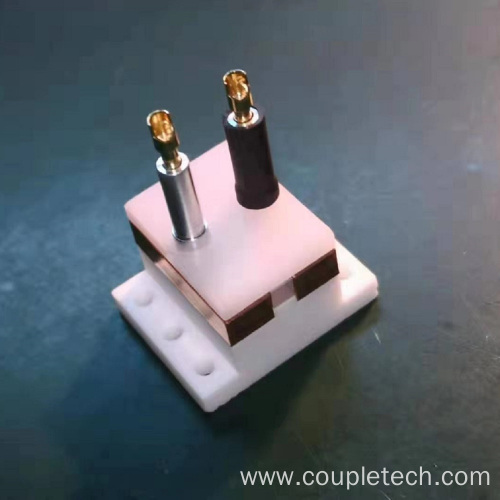
- English
- 简体中文
- Español
- Português
- русский
- Français
- 日本語
- Deutsch
- tiếng Việt
- Italiano
- Nederlands
- ภาษาไทย
- Polski
- 한국어
- Svenska
- magyar
- Malay
- বাংলা ভাষার
- Dansk
- Suomi
- हिन्दी
- Pilipino
- Türkçe
- Gaeilge
- العربية
- Indonesia
- Norsk
- تمل
- český
- ελληνικά
- український
- Javanese
- فارسی
- தமிழ்
- తెలుగు
- नेपाली
- Burmese
- български
- ລາວ
- Latine
- Қазақша
- Euskal
- Azərbaycan
- Slovenský jazyk
- Македонски
- Lietuvos
- Eesti Keel
- Română
- Slovenski
- मराठी
- Srpski језик
What Makes a Pockels Cell an Essential Electro-Optic Component in Modern Laser Systems?
A Pockels Cell is a high-performance electro-optic device widely used in laser modulation, Q-switching, pulse picking, and beam control for scientific, industrial, and medical applications. Its ability to rapidly change the polarization state of light under an applied electric field makes it indispensable in advanced optical setups. In this article, I will walk through its functions, significance, performance effects, and detailed specifications offered by Coupletech Co., Ltd., ensuring clarity, logic, and professional technical depth.
How Does a Pockels Cell Work in a Laser System?
A Pockels Cell operates based on the Pockels effect, where certain crystals (such as BBO, RTP, KTP, LiNbO₃, DKDP) change their refractive index when exposed to an electric field. This change influences the polarization of the passing laser beam, enabling:
-
Fast intensity modulation
-
Q-switching for short and powerful laser pulses
-
Pulse selection in high-repetition laser systems
-
Beam steering and phase control
-
Optical shuttering
Its extremely fast response time and ability to handle high peak power make it a critical component in precision optical systems.
Why Is a Pockels Cell Important for High-Performance Laser Applications?
A Pockels Cell is vital because it ensures stability, speed, and beam-quality control. Without it, many laser processes—such as material processing, biomedical imaging, nonlinear optics, or scientific experimentation—would lack the necessary precision and repeatability. Coupletech Co., Ltd. provides Pockels Cells manufactured with high optical purity, strict alignment accuracy, and reliable high-voltage performance, ensuring long-term stability in demanding environments.
What Are the Key Parameters of Our Pockels Cell?
Below is a simplified but professional-grade specification table for our standard Pockels Cell models:
Pockels Cell Technical Parameters
| Parameter | Specification |
|---|---|
| Aperture Size | 2–12 mm |
| Crystal Materials | BBO, DKDP, LiNbO₃, RTP, KTP |
| Wavelength Range | 266 nm – 2100 nm |
| Half-Wave Voltage (Vπ) | 2.8 kV – 7.5 kV (depending on crystal and size) |
| Extinction Ratio | ≥ 1000:1 |
| Optical Damage Threshold | ≥ 500 MW/cm² |
| Repetition Frequency | Up to MHz level |
| Temperature Stability | ±0.1 °C (with optional oven) |
| Coatings | AR coatings customizable for different wavelengths |
| Operation Mode | Q-switching / Pulse Picking / Modulation |
Additional Features Provided by Coupletech Co., Ltd.
-
High-precision crystal orientation
-
Low absorption and scattering
-
High extinction ratio design
-
Customizable aperture and wavelength
-
Compatible high-voltage drivers available
These parameters ensure stable, precise, and repeatable modulation, even under high-power laser conditions.
How Does a Pockels Cell Improve Laser Output and System Performance?
A Pockels Cell enhances system performance in several ways:
-
Better Pulse Control: Produces shorter, cleaner laser pulses.
-
Higher Repetition Rates: Maintains stability at high frequencies.
-
Improved Beam Quality: Reduces noise and enhances overall beam consistency.
-
High Power Capability: Handles large energy loads without degradation.
-
Long Service Life: High-quality crystals provide durability even in continuous industrial operation.
These factors contribute to efficient processing, more accurate measurements, and improved imaging results.
FAQ About Pockels Cell
Below is a clear FAQ section using Pockels Cell as the core keyword, presented in question-and-answer format:
1. What factors should I consider when selecting a Pockels Cell?
Choose based on wavelength, aperture size, crystal material, extinction ratio, half-wave voltage, and power handling capability. Matching the Pockels Cell model to your laser type ensures optimal performance.
2. Why does the half-wave voltage matter in a Pockels Cell?
The half-wave voltage determines the electric field required to achieve a 180° polarization rotation. Lower Vπ offers faster switching, reduced driver requirements, and more efficient modulation.
3. How can a Pockels Cell be integrated into a pulse-picking system?
It is typically placed between crossed polarizers and driven by a high-voltage modulator. When the electric field changes, the Pockels Cell alters polarization, allowing accurate selection of individual pulses in high-frequency lasers.
4. What advantages does Coupletech Co., Ltd. offer for Pockels Cell customization?
The company provides flexible crystal material selection, coating customization, precision alignment, and reliable high-voltage drivers, ensuring compatibility with various industrial and scientific laser systems.
Why Choose Coupletech Co., Ltd. for Your Pockels Cell Needs?
Coupletech Co., Ltd. has long specialized in optical components and electro-optic devices, offering strict quality control, advanced manufacturing, and global engineering support. Whether for research laboratories, industrial machining, medical lasers, or defense applications, our Pockels Cell solutions guarantee stability, precision, and durability.
For more information or technical consultation, please contact Coupletech Co., Ltd. anytime.



